20 Years of Good Trouble: An interview with Microcosm founder Joe Biel
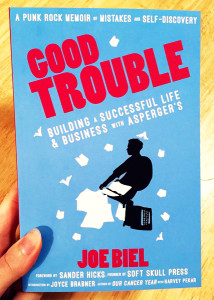 Meet Joe! He is Microcosm’s founder, first employee, and author of our next release, Good Trouble: Building a Successful Life and Business with Asperger’s. I haven’t interviewed Joe previously for this series because, well, for one thing he is super busy filling out forms and putting out fires. And for another thing, he’s the boss, and it doesn’t seem entirely serious to ask your boss what his favorite snacks are. But then I figured that if we are too serious to talk about snacks, then we should probably take ourselves less seriously. And there’s a new book to tell you about. So, here it is, a bunch of questions for Joe!
Meet Joe! He is Microcosm’s founder, first employee, and author of our next release, Good Trouble: Building a Successful Life and Business with Asperger’s. I haven’t interviewed Joe previously for this series because, well, for one thing he is super busy filling out forms and putting out fires. And for another thing, he’s the boss, and it doesn’t seem entirely serious to ask your boss what his favorite snacks are. But then I figured that if we are too serious to talk about snacks, then we should probably take ourselves less seriously. And there’s a new book to tell you about. So, here it is, a bunch of questions for Joe!
1. You wrote this amazing book, Good Trouble, that tells your story and the story of Microcosm. Working with you, I’ve learned that you’re cautious about accepting memoirs. What’s the difference between a memoir worth publishing and one that isn’t, and how does your book suit the bill? Why did you decide to write the book?
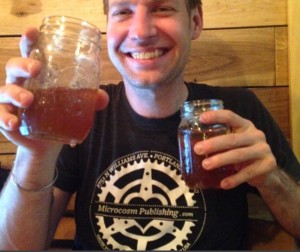 Thank you. I would like to believe that I’m cautious about everything but most of the rest of the staff would probably disagree. In prehistoric times, a memoir was simply a story. If we’re using marketing terms, a memoir could simply be a nonfiction novel. But a novel has a narrative, characters, plot, a theme, and an arc. Many writers don’t engage the reader as a stakeholder in their writing and many of the memoirs that are submitted to us are expected to be published on the grounds that they have been written. For a memoir to work, it needs to have all of those components and have a clear concept of what it is, who it is for, and how it is different from the pack. My book is for would-be publishers, young adult Aspies, Microcosm fans, and people who want to start businesses. There needs to be at least 5,000 of these people out there and we need to know how to reach them. I am too close to the work to tell you if mine succeeds but thankfully everyone who I have heard from so far has enjoyed it immensely so I am thankful that I have good editors and that I put so many hours into it.
Thank you. I would like to believe that I’m cautious about everything but most of the rest of the staff would probably disagree. In prehistoric times, a memoir was simply a story. If we’re using marketing terms, a memoir could simply be a nonfiction novel. But a novel has a narrative, characters, plot, a theme, and an arc. Many writers don’t engage the reader as a stakeholder in their writing and many of the memoirs that are submitted to us are expected to be published on the grounds that they have been written. For a memoir to work, it needs to have all of those components and have a clear concept of what it is, who it is for, and how it is different from the pack. My book is for would-be publishers, young adult Aspies, Microcosm fans, and people who want to start businesses. There needs to be at least 5,000 of these people out there and we need to know how to reach them. I am too close to the work to tell you if mine succeeds but thankfully everyone who I have heard from so far has enjoyed it immensely so I am thankful that I have good editors and that I put so many hours into it.
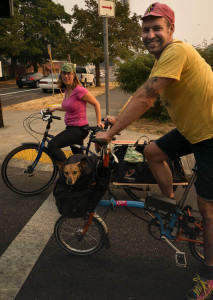 I started working on this book about six years ago before I knew how the story would end. I had just been diagnosed with Asperger’s but I didn’t yet know what was next in the narrative. I actually thought that this book would make more sense with a more traditional publishing house but the staff at Microcosm pushed me to do it for our 20th anniversary and my economic sense got the best of me, since I would earn more publishing it with Microcosm and I wouldn’t suffer the fate of my last book where it was picked up by multiple publishers before they either dropped it or went out of business. I’m really proud of the results and I think that mostly speaks to the presence and clarity I’ve developed around events in my own life largely as a result of writing the book.
I started working on this book about six years ago before I knew how the story would end. I had just been diagnosed with Asperger’s but I didn’t yet know what was next in the narrative. I actually thought that this book would make more sense with a more traditional publishing house but the staff at Microcosm pushed me to do it for our 20th anniversary and my economic sense got the best of me, since I would earn more publishing it with Microcosm and I wouldn’t suffer the fate of my last book where it was picked up by multiple publishers before they either dropped it or went out of business. I’m really proud of the results and I think that mostly speaks to the presence and clarity I’ve developed around events in my own life largely as a result of writing the book.
2. In your book, you come out to the whole world as having been diagnosed with Asperger’s as an adult. What’s it like to come out with this and tell the world? Were you nervous? How have people responded so far?
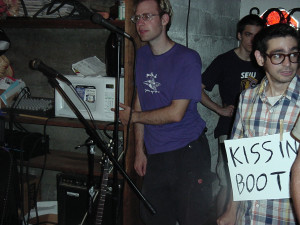
I kept my diagnosis a secret for six years because I had been bullied so badly both as a child and as I began to attempt to privately come out to people after my diagnosis. Those experiences gave me a very different way of seeing the communities that I had been involved closely with for almost my entire life—as a whole they did not want to embrace the analytical skills necessary to understand what my diagnosis meant and how that it had affected my ability to perceive situations across my whole life. Asperger’s is really traumatic because you are constantly in a social dynamic where you are accidentally offending and upsetting people and you don’t understand why. Obviously, the biggest solution is the cognitive training to mimic the social skills and empathy of neurotypicals but that would have been much smoother if my scene had been at least willing to incorporate my disability into understanding what I was going through. Ironically, people that I have told outside of the punk or zine scenes have generally been really supportive and understanding and it has lead to great conversations and finding other Aspies. Telling my story publicly has been really important because people no longer will deny my experience in the way that they have been when I tried and come out to them one on one.
3. Please share some favorites: Your favorite snacks, favorite hobby, favorite place in Portland, favorite place not in Portland, favorite Microcosm book, favorite non-Microcosm book.
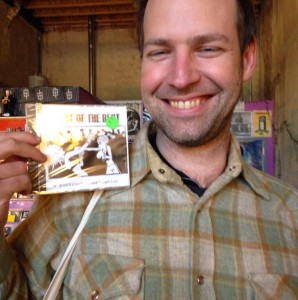 My favorite snacks are Beanitos and various fruits.
My favorite snacks are Beanitos and various fruits.
My favorite hobbies are to 1) sort my pills and 2) have a relatively scheduled but somewhat free hour or two to drop into places that I don’t get to see often enough.
I love the Avalon Wunderland in Portland because it’s stuck in time as the whole city is changing and the dysfunctional aspects of the place take decades to work out. Other favorite places are Extreme Noise in Minneapolis and Muddy Waters in San Francisco. They both tie to important times in my life and again their unchanging nature is refreshing in 2016.
I had to think long and hard about this but I think my favorite Microcosm book is Firebrands—the reason is complex. It’s mostly because I didn’t do any of the work on the book so I got to enjoy it as a reader first and foremost. While it looks like it is gallery guide or something, I stand by the art and writing six years later. It’s very much an emotional rollercoaster and completely inspires me to this day. The stories in it told me that there is so much more life to be lived when I felt like I had been everywhere and done everything.
I think my favorite non-Microcosm book is Jon Ronson’s Them because it encapsulates what I think my life would look like if my upbringing had been more supportive and privileged: doing on-site humorous reporting about fringe weird shit all over the globe without handing the punchlines to the reader.
4. Are you ready for the next 20 years? What’s the plan? When you think about celebrating 40 years, what do you see?
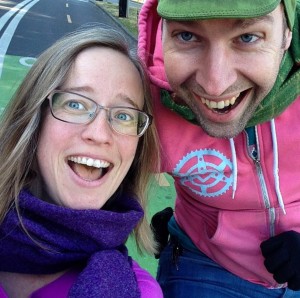 As I wrote on the Powell’s blog story, I feel like it is now the era of the small press. That is partly because we are much more in touch with what our readers actually want from us and also partially because we are able to adapt much more easily and quickly. I really enjoy how the publishing industry has changed and that’s where I differ from most of my peers. I feel like it gave me a new game to learn and become proficient at. Title development will become increasingly important and thus increasingly refined at Microcosm. Data will inform our best practices.
As I wrote on the Powell’s blog story, I feel like it is now the era of the small press. That is partly because we are much more in touch with what our readers actually want from us and also partially because we are able to adapt much more easily and quickly. I really enjoy how the publishing industry has changed and that’s where I differ from most of my peers. I feel like it gave me a new game to learn and become proficient at. Title development will become increasingly important and thus increasingly refined at Microcosm. Data will inform our best practices.
Microcosm spent several years trying to find a mentor, a business that was larger than us but still independent without being owned by investment bankers. We found only one company so far that fits this bill, which is disheartening. But for me this is a better reason to succeed on our own terms and these are the kinds of things that motivate me. I would guess that our backlist will more than double in the next 20 years and we’ll have produced about 800 original books by our 40th.
One important area where we are changing is no longer relying on one book each year to be a fly-away bestseller. Instead, we are much more comfortable expecting each book selling 3,000-5,000 copies and if one does better than that, we know how to handle it but we aren’t reliant upon it like we were in 2009.
I now organize our cash flow a year in advance and budget that far ahead as well. It prevents a lot of stress and hair loss.
Anything else I should ask?
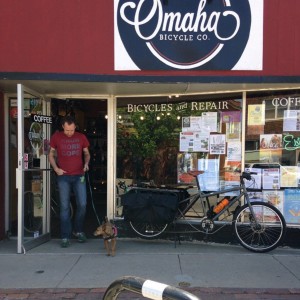 Before my diagnosis, I suspect that I’ve been hard to work with over the first fourteen years. A lot of people have done a lot of work around here and I don’t feel they get acknowledged enough. Nate Beaty has been programming our databases and website since 2002 and created a lot of our data-driven systems. He is probably the only reason that Microcosm was organized enough to exist past 2007. But more importantly, we were able to work together on creating tools that allowed individuals to make informed decisions without having to pull out giant file stacks and dig out records. Nate has created enough that Microcosm staff can be informed every day about what best practices are.
Before my diagnosis, I suspect that I’ve been hard to work with over the first fourteen years. A lot of people have done a lot of work around here and I don’t feel they get acknowledged enough. Nate Beaty has been programming our databases and website since 2002 and created a lot of our data-driven systems. He is probably the only reason that Microcosm was organized enough to exist past 2007. But more importantly, we were able to work together on creating tools that allowed individuals to make informed decisions without having to pull out giant file stacks and dig out records. Nate has created enough that Microcosm staff can be informed every day about what best practices are.
It’s been really neat to see the Aspies come out of the woodwork and how many old Microcosm fans reappear for the anniversary. They all have really great stories and, Buddy Hershey, the oldest customer that I know of who still orders, sent me a really sweet gift for the occasion. Because of my Asperger’s my life has mostly been solitary and as much as I have picked up social skills in the last decade I mostly think back to the times that I was alone as the happiest so it’s nice to create a new narrative where I can be happy and around other people at the same time.
This has been an interview with Microcosm founder Joe Biel. Read more in his new book, Good Trouble.